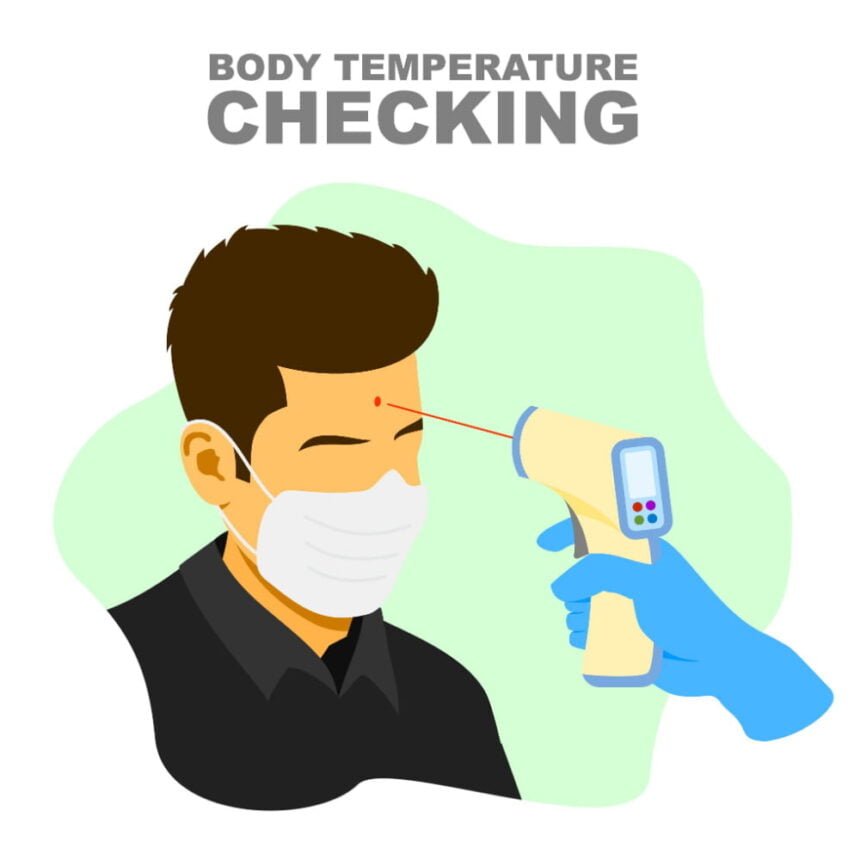There is a familiar pattern to your doctor’s appointments: They take your weight, temperature, and blood pressure to record them. Even though the findings are normally spoken openly by the nurse, you could be left thinking about what these figures signify. “Is that common?” When you’ve been informed that your health is amazing, it’s helpful to know what the figures represent. This is where the core body temperature comes into the picture.
The physiological condition at which the biological systems and internal organs function at their best is known as core body temperature. It is a component of thermoregulation, or the body’s capacity to regulate its internal temperature within a narrow range. The core body temperature of a person, which is a crucial parameter used to evaluate their health, normally swings from 97.7ºF to 99.5 °F (or 36.5 °C to 37.5 °C) and is 73,4 º F (or 23 °C) higher than their skin temperature.
There is no need to learn about physics to know that our bodies perform optimally when they are retained at an ideal temperature. People tend to look for a warmer spot or wear a sweater when it becomes too chilly. Taking a plunge or turning on the air conditioning is a common response when it becomes too hot outside. However, the goal here is more than just a desire for ease. There’s a deeper meaning behind our desire for a “perfect” core temperature. Metabolic processes and enzymatic reactions are most efficient when they occur within a certain range. An abrupt change in the temperature of our body, even within this narrow range, is exceedingly harmful and may even be fatal.
What Are the Reasons for Measuring the Core Body Temperature?
Your core body temperature can tell you a lot about what’s going on inside of you in a matter of seconds. Temperature changes are caused by the body’s efforts to maintain or reduce its temperature. Maintaining a stable body temperature is far more difficult than coping with fluctuating weather conditions. Temperatures of 98.6 º F (or 37 °C) are considered normal for most people; however, they may fluctuate by up to one degree.
Expansion of the blood vessels that supply your skin’s surface with heat occurs as your body heats up. As a result, you begin to sweat profusely in an attempt to safeguard your body from the heat. Fever in adults is defined as a temperature over 101.4 º F (or 39 °C). It may be defined as infection, drugs, malignancy, or serious injuries, such as strokes and heart attacks. You may even die if your body’s temperature rises dangerously and you can’t control it. Severe dehydration may occur as a result of a high temperature because the body does not retain sufficient water and necessary fluids to function properly.
Conversely, blood vessels dilate when the body temperature drops below 98.6 º F (or 37 °C), which helps retain. Shivering is a good way to regulate your core body temperature because it causes your muscles to contract, which generates heat. Hypothermia, or a drop in core body temperature, can be life-threatening and even fatal in certain cases. Shock (having abruptly fainted out or unconscious), drug or alcohol overindulgence, or metabolic problems such as hypothyroidism or diabetes may all cause low body temperature.
Which is the Best Device or Method to Measure the Core Body Temperature?
There are a variety of devices and methods available for taking a core body temperature reading. The standard approach includes inserting a thermometer underneath the tongue of the person; this method is sensitive to factors, such as the location of the tongue or perhaps the accumulation of fluids inside the mouth, which can sometimes impact the core body temperature reading. The placement of a thermometer in the underarm of a person is a well-acknowledged alternate method of detecting body temperature. Likewise, the reading of the thermometer would be inaccurate if it was put in a position that exposed it to cold skin, and they only measure the temperature in an exact period of time.
Thus, we can consider that there cannot be anything more accurate than the use of a wearable core body sensor. When worn, these types of devices keep tabs on your core body temperature in real-time with thousands of data. Because the best sensors are outfitted with a cutting-edge thermal energy transfer sensor and harness the power of an artificial intelligence system (with one billion data points), they can undergo continuous optimization. Moreover, these gadgets can be used for ordinary life, such as fever or very high ambient temperature while doing medium-low exercise and intense endurance sports activity with high heart rate.
When Should You Consult Your Doctor?
According to researchers, a person with an abnormally high or low core body temperature must be handled as if it were a life-threatening emergency. It’s frequently an indication of disease or exposure to excessive heat or cold when your core body temperature is abnormally high or low. A visit to your doctor is a must if you’re not feeling well, have discomfort, notice fluctuations in your appetite or weight, or notice variations in your core body temperature. If your core body temperature fluctuates for no apparent reason, make an appointment with your doctor right then.
Summing Up
These days, we have access to the latest technologies that have the potential to revolutionize how we measure the core body temperature. It’s possible that with the introduction of constant temperature monitoring, we won’t have to pick between precision and ease anymore. The time series analysis that can be gathered from a device that monitors temperature in a linear pattern might have a range of possible uses, such as in sports analysis or in tracking a fever in your kid.










